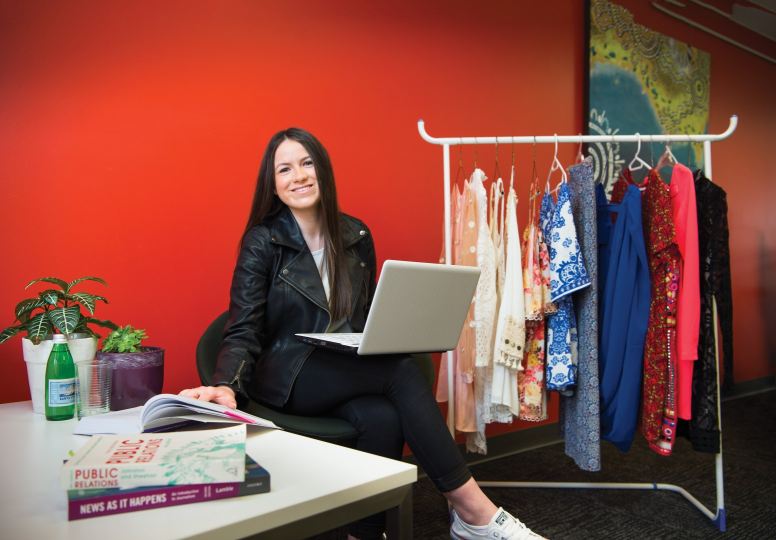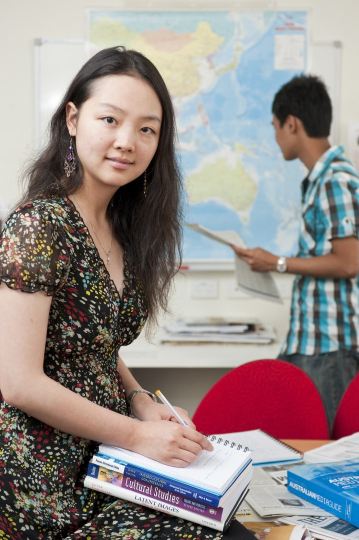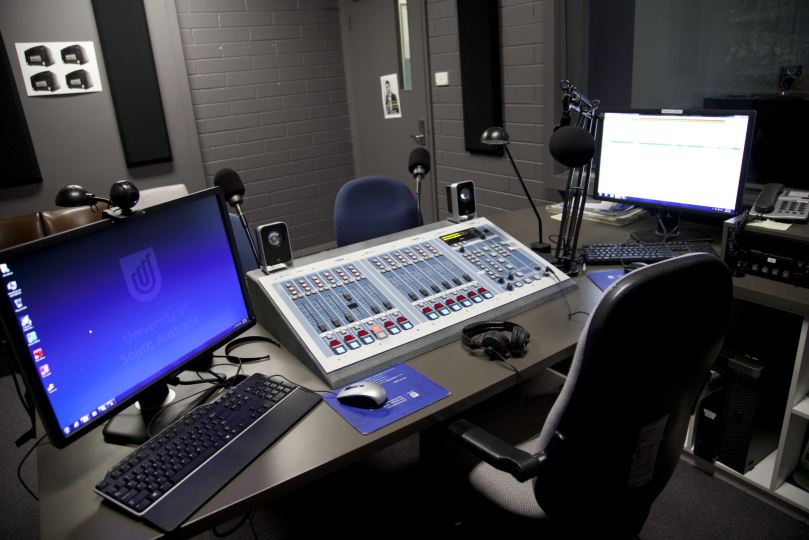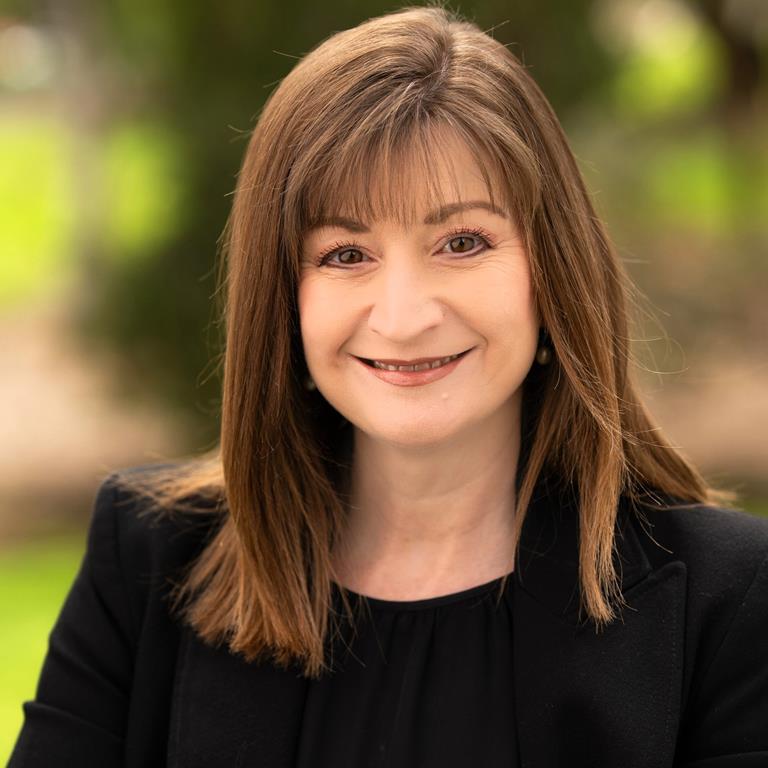Bachelor of Communication and Media
Degree Level Undergraduate
Year 2024
You're considered an Australian student if you are any of the following:
Degree Level Undergraduate
Year 2024
Entry Scores
2024 Guaranteed Entry
Year 12 (ATAR-based): 65.00
Year 12 (Grades-based): B,B,C
TAFE/RTO: DIP
View Guaranteed Entry Info
2023 Cut-Offs
Year 12 (ATAR-based):
- Internal: 65.00
TAFE/RTO: Cert IV
View full entry requirements
The admission criteria have been grouped to assist you to easily find the information most relevant to your circumstances. However, you may fit into more than one and the university will consider applicants against each of the relevant criteria.
Certain conditions apply. For more information refer to Appendix 4 of the University's Selection and Entry policy.
Applicants are required to meet one of the following criteria with a competitive result, and demonstrate that they fulfil any prerequisite requirements and essential requirements for admission:
Recent secondary education
Meet any prerequisite requirements with a minimum grade of C- or equivalent
AND
Applicants who have not achieved the Selection Rank required for automatic selection may be selected for any remaining places based on the grades of their year 12 subjects.
OR
Higher education study
OR
Vocational Education and Training (VET)
OR
Work and life experience
This degree can be packaged with a masters degree. For more information and SATAC codes visit Fast-track to Masters
1ComparED (QILT) Student Experience Survey 2021-22, Communications – Skills Development Indicator (Undergraduate). SA public universities.
2ComparED (QILT) Student Experience Survey 2021-22, Communications – Learning Resources Indicator (Undergraduate). SA public universities.
32018 Excellence in Research for Australia (ERA).
4UNSTOPPABLE® is a Kellogg Company trade mark used under licence. Ranked #52, 2023 THE Young University Rankings.
Skilled communicators are essential in every organisation and industry sector, and this adaptable degree will equip you with the knowledge and skills to plan, develop and deliver communication activities across a range of platforms.
You will develop skills in:
Practical, real-world experience is a key component of this degree and in your final year you will complete an industry internship. Industry and community engagement opportunities are also featured in several courses, enabling you to put your skills to practice on real communication projects.
Eligible students can gain a further competitive advantage by completing an undergraduate degree in Communication and Media with a Master of Communication in just four years. This is a great way of elevating your career prospects.
Based on academic merit and quota, you may have the option to do the one-year Bachelor of Arts (Honours) at the end of this degree. Honours is an intensive year of advanced study that develops your abilities in academic research. It allows you to research a topic that interests you. Other selection criteria may apply.
If you’re interested in studying a combined degree with the Bachelor of Communication and Media, please submit an enquiry and we’ll get in touch to discuss your options.
Current combined degree options include the Bachelor of Communication and Media and:
This degree offers flexible study options with all courses being available at Magill campus, City West campus or Online.
You will learn how to write, plan, deliver and evaluate communication strategies that engage and inform target audiences using a range of media platforms. With a focus on communication for both traditional and online media, you'll study:
Studying communication and media at UniSA gives you the flexibility to select a sub-major, so you can specialise in fields such as journalism, film and television, social media, marketing, or digital media. A social media sub-major would be highly desirable in a social media management role, while a journalism sub-major would prepare you for media advisor roles. If you're interested in digital content, then a digital media sub-major may be for you. Other popular sub-majors include marketing, film and television, tourism, and event management.
You will also select two electives, enabling you to further build on your skills and knowledge. There is a focus on professional practice, and during your final year, you will get the opportunity to complete an industry placement working in a public relations, social media, communication management or media role.
You can gain an extra qualification and broaden your career prospects by completing a Diploma in Languages.
This degree has been developed and designed with industry, which means it is relevant, up-to-date and guaranteed to provide you with the best start in this fast-paced industry.
In fact, the curriculum continues to be informed by industry partners, meaning you’re accessing content and knowledge which is always relevant and up to date. This style of learning, combined with final-year real-world experience, ensures you'll graduate career-ready. You will also have the choice of studying on-campus at Magill and City West or online, which is great news for students who are trying to fit study in among work and other life commitments.
Skilled communicators are essential in every organisation and industry to plan, develop and deliver communication across a range of platforms and situations. From social media to crisis communication, get ready to share and shape the stories of your organisation and industry. There is no better time to begin a career in communication and media.
As a professional communicator you will be interested in the world around you, current affairs, public communication in all its forms, and the communication aspects of political, economic and social issues. You will also have a passion for writing and language, a curiosity about why and how people communicate, and a desire to use communication skills to promote understanding of significant political, social, cultural and scientific issues and events. Careers to consider:
Applying to study with us:
Australian
There are other pathways you can follow to study this degree, including:
International
There are other pathways you can follow to study this degree, including:
This degree is available for deferment. This option is made available by responding to your offer during the application process via the SATAC website. Applicants who receive an offer into a midyear degree are eligible to defer for six months.
Every year, over 2,500 UniSA students are supported in their studies through scholarships and grants worth millions of dollars. Check out the scholarships below. One of them may be perfect for you. Visit our scholarships page for more.
$5,000 scholarship for South Australian students with an ATAR of 99 who enrol to study a UniSA undergraduate degree.
Up to $10,000 per annum (full time) for South Australian students who obtain an ATAR of 99.95 or IB equivalent and enrol to study at UniSA.
Our campuses are home to fantastic facilities including modern lecture theatres, libraries, workshops and laboratories, as well as spaces that simulate real work environments. But you’ll also discover that your journey at UniSA is about social experiences, healthy living and getting involved. You’ll find student sports and fitness facilities, community clinics, tech zones and chill-out spaces. There are campus sport activities to keep you active, and if you are keen to explore the social side of university life, there are movies, cooking demonstrations, parties and loads more.
Adelaide also has a variety of accommodation options to suit different requirements and budgets. Options include dedicated student accommodation and private rentals. See our long-term accommodation pages, or explore our student accommodation by Scape on Bank Street in Adelaide’s lively cultural precinct, an ideal location for students. It is within easy reach of UniSA’s city and metropolitan campuses, Rundle Mall shopping, the Central Market, Chinatown, and the West End’s vibrant nightlife. It is also across the road from the Adelaide train station, and on bus and tram routes.
Communication is at the core of how we live today in our connected and globalised world.
Effective communication and media management allows us to influence behaviour and decisions, to increase awareness and profile, to build reputation, and to facilitate the exchange of mass information. Communication and media roles exist within all industry sectors and many types of organisations, creating a wealth of opportunities for our graduates. There is no other field that has that reach.
There are a number of ways to apply to study UniSA's undergraduate and postgraduate coursework degrees.
Applications for admission into the University of South Australia’s undergraduate and most postgraduate degrees are made via the South Australian Tertiary Admissions Centre (SATAC). Visit satac.edu.au and follow the links.
For the MBA degrees please apply through the UniSA MBA Application Portal. Applications for a small number of degrees are submitted direct to UniSA through our Apply Online portal. It will be noted on the degree page if you need to apply via Apply Online.
Postgraduate study by research
For information on applying to do postgraduate study by research, including Master of Research, PhDs or Doctorates, please visit unisa.edu.au/resdegrees.
Undergraduate
Yes. The deadline to apply to study a degree at UniSA for semester one (commencing late February) and be given equal consideration is in early December. While you may be able to apply after this date, you are not guaranteed to be considered equally with other applicants and your application may not be assessed in time for the main round of offers (mid January). Some degrees will not make any offers after the main offer round. Please click here find all of the key dates for applications here.
Postgraduate
Most postgraduate degrees do not have a closing date for applications. However, there are exceptions, so it is best to check – either on the SATAC website, Apply Online or the degree homepage. Postgraduate offers are normally ‘rolling’, meaning they may be sent out at any time up until the program starts. This also means that applications may close at any time without warning, if the quota is filled earlier. For this reason, postgraduate applications should be submitted without delay. For more information, please contact our Future Student Enquiries team on (08) 8302 2376 or via the online enquiry form.
Credit transfer or advanced standing
You may be eligible to receive a credit transfer or advanced standing for your chosen UniSA degree based on your previous studies, if they are in a related area at an equivalent or higher level. Receiving a credit transfer will reduce the number of courses you undertake within the degree, and may also reduce the overall duration of your degree.
Recognised prior learning
If you have related industry experience, you may also be eligible to receive recognised prior learning for this experience. Receiving recognised prior learning will normally reduce the number of courses you undertake within the degree, and can reduce the duration of the degree.
How do I get credit?
Credit transfer and recognition of prior learning is assessed on a case-by-case basis by the Program Director who will discuss your prior learning and experience with you to ascertain what credit you may be eligible for.
Many of our credit transfer arrangements are listed on our online Credit Assessor.
UniSA welcomes the opportunity to speak with you regarding your study options. Our staff are able to talk to you about degree information, career outcomes and pathways, entry requirements, applications, and student life, so that you are able to make the best study decision for your future.
Click here to book a 1:1 appointment with one of our enquiries team.
If you are interested in studying an MBA please contact admissions@unisa.edu.au and our Future Student Enquiries team will contact you regarding your enquiry.
Alternatively, you can complete a MyCareerMatch career profile. MyCareerMatch is an online career profiling tool that you can use free-of-charge through UniSA. MyCareerMatch specialises in career profiles and provides you with a personalised career report outlining information about your personality style and a list of career options, which are complementary to your natural strengths and talents.
We have many events throughout the year where you can speak with a lecturer or tutor about your degrees of interest. You can find out what is happening at UniSA by visiting our events page or by signing up to our mailing list, so you're the first to know about careers events, information sessions, degree requirements, scholarships and more!
There are also many career counsellors external to the University that you can discuss your career options with. If you are unsure where to start your search, you can contact the Government's Work Ready team (formally Skills for All). Visit skills.sa.gov.au or call 1800 506 266.
You may also find Job Outlook a helpful resource in your decision-making.
It can be difficult to decide what degree you would like to do and where. You might find information from government organisations will help to weigh up your degree and provider options.
Find a course or a provider
TEQSA is a regulatory body for higher education providers. Use the TEQSA national register of higher education providers to search for a course or a provider. Compare courses and providers for undergraduates and postgraduates using the Quality Indicators for Learning and Teaching (QILT) online comparison tool.
More information on university admission
Visit the SATAC website to find out important news, events and information on applying to university in South Australia. Visit Study with Us to find out everything you need to know about studying at UniSA, admissions and the application process.
Questions about your application
If you have any questions or concerns regarding your application you should contact the Future Students Enquiries team in the first instance.
Hear from Minnie as she shares her experiences studying at UniSA and her journey as a Communication and Media graduate.
Hear from Alana as she shares her experiences studying at UniSA and her journey as a Bachelor of Communication and Media student.
Hear from Kit as he shares his experiences studying Communication and Media at UniSA.








